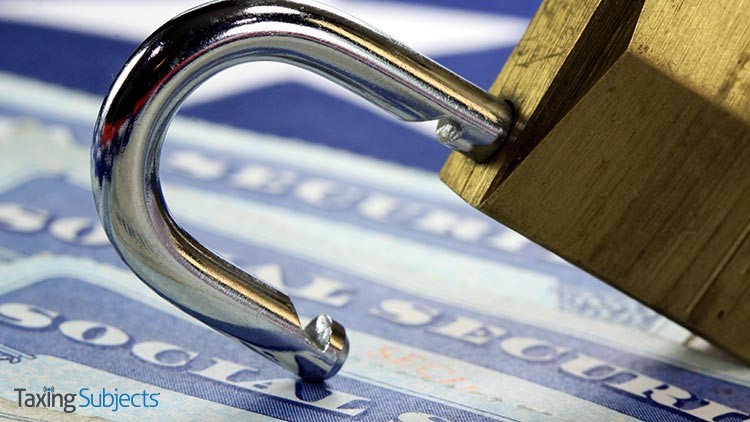by | Nov 30, 2020 | Tax Tips and News
A warning has been issued to all taxpayers and tax professionals alike: Beware of scams and identity theft schemes by criminals taking advantage of the holiday shopping period, the approaching tax season and the coronavirus pandemic.
The warning comes from the Internal Revenue Service and its Security Summit partners as the IRS, state tax agencies and the income tax industry kick off National Tax Security Awareness Week at the traditional start of the holiday shopping season.
Holiday shopping, combined with the upcoming tax season and an increased trend toward working remotely, makes increased online security an absolute necessity.
“This is generally the hunting season for online thieves, but this year there’s a dangerous combination of factors at play that should make people more alert,” said IRS Commissioner Chuck Rettig. “The combination of online holiday shopping, the approaching filing season and more of us are working remotely puts people more at risk. People can help avoid becoming victims of scams or identity thefts, by taking a few simple steps to help protect sensitive tax and financial information.”
The Security Summit—which teams up the IRS, state tax agencies and members of the nation’s tax industry at large—marks the start of this, the fifth National Tax Security Awareness Week, with some basic tips on safeguards everyone should take.
Here are a few basic steps—for everyone:
- Don’t forget to use security software for computers and mobile phones –- and keep it updated.
- Make sure purchased anti-virus software has a feature to stop malware, and there is a firewall that can prevent intrusions.
- Phishing scams—like imposter emails, calls and texts—are the leading way thieves steal personal data. Don’t open links or attachments on suspicious emails. This year, fraud scams related to COVID-19 and the Economic Impact Payment are common.
- Use strong and unique passwords for online accounts. Use a phrase or series of words that can be easily remembered or use a password manager.
- Use multi-factor authentication whenever possible. Many email providers and social media sites offer this feature. It helps prevents thieves from easily hacking accounts.
- Shop at sites where the web address begins with “https”—the “s” is for secure communications over the computer network. Also, look for the “padlock” icon in the browser window.
- Don’t shop on unsecured public Wi-Fi in places like a mall. Remember, thieves can eavesdrop.
- At home, secure home Wi-Fi with a password. With more homes connected to the web, secured systems become more important, from wireless printers, wireless door locks to wireless thermometers. These can be access points for identity thieves.
- Back up files on computers and mobile phones. A cloud service or an external hard drive can be used to copy information from computers or phones—providing an important place to recover financial or tax data.
- Working from home? Consider creating a virtual private network (VPN) to securely connect to your workplace.
Don’t overlook your phone.
The Security Summit partners also note that these precautions don’t just cover office computers—they apply to smartphones as well. Keep in mind that thieves have become much more adept at compromising cellphones. Phone users are also more prone to open a scam email from their phone than from their computer.
Taxpayers can check out security recommendations for their specific mobile phone by reviewing the Federal Communications Commission’s Smartphone Security Checker. Since phones are used for shopping and even for doing taxes, remember to make sure phones and tablets are just as secure as computers.
The truth shall keep you safe.
Some basic facts can keep you out of trouble when it comes to cybercriminals. The IRS will not call, text or email about your Economic Impact Payment or your tax refund. Nor will the IRS call with threats of jail or lawsuits over unpaid taxes. Those are scams.
The Federal Bureau of Investigation has already issued warnings about fraud and scams related to the pandemic. It specifically warned of COVID-19 schemes related to taxes, anti-body testing, healthcare fraud, cryptocurrency fraud and others.
COVID-related fraud complaints can be filed at the National Center for Disaster Fraud.
The Federal Trade Commission also has issued alerts about fraudulent emails claiming to be from the Centers for Disease Control or the World Health Organization. Keep atop the latest scam information and report COVID-related scams at www.ftc.gov/coronavirus.
This is the first in a week-long series of reminders to raise awareness about identity theft. Check out IRS.gov/SecuritySummit for more details.
Source: IR-2020-265
– Story provided by TaxingSubjects.com
by | Nov 25, 2020 | Tax Tips and News
The Internal Revenue Service and the Treasury Department have issued their final regulations on section 1031 like-kind exchanges. The regulations clarify the definition of real property under section 1031, while providing a rule governing the receipt of personal property incidental to real property in a like-kind exchange.
TCJA Limits Focus of Like-Kind Exchange
Legislation passed into law in 2017 as part of the Tax Cuts and Jobs Act (TCJA) limited like-kind exchange treatment to exchanges of real property.
As of Jan. 1, 2018, exchanges of personal or intangible property — such as vehicles, artwork, collectibles, patents, and other intellectual property — generally do not qualify for the same treatment of gain as do like-kind exchanges.
In addition, like-kind exchange treatment applies only to exchanges of real property held for use in a trade or business or for investment. An exchange of real property held primarily for sale doesn’t qualify as a like-kind exchange.
Under the final regulations, “real property” includes land and generally anything built on or attached to the land. As a rule, real property also includes property considered real property under state or local law.
Certain intangible property, such as leaseholds or easements, also qualifies as real property under section 1031.
It should be noted that property that wasn’t eligible for like-kind exchange treatment before the TCJA was passed remains ineligible. Neither the TCJA nor the final regulations change whether those properties are of like kind.
Reporting an Exchange
To report a like-kind exchange, taxpayers file a Form 8824, Like-Kind Exchange. The form should accompany the filer’s tax return for the year property was transferred as part of a like-kind exchange.
The Form 8824 helps taxpayers figure the amount of gain deferred as a result of the like-kind exchange, as well as the basis of the like-kind property received.
The form also helps taxpayers calculate the amount of gain they must report if cash or property that is not of a like-kind is involved in the exchange.
For more information about like-kind exchanges and other tax reform changes, visit IRS.gov/TaxReform.
Source: IR-2020-262
– Story provided by TaxingSubjects.com
by | Nov 24, 2020 | Tax Tips and News
The Internal Revenue Service is pairing up with a Virginia research firm in an effort to improve the agency’s procurement operations.
Data and Analytic Solutions of Fairfax, Va., will team up with the IRS and a group of academic researchers with a shared goal of using data science to better understand and streamline the procurement process—the process the government uses to purchase goods and services from outside vendors.
Time for a team approach?
The effort will bring together a multi-disciplinary team made up of procurement practitioners, university professors and students with procurement and machine learning experience. Machine learning is a form of artificial intelligence that makes computers more accurate at predicting outcomes without being specifically programmed.
“As with many agencies, we have a wealth of data available to us to understand where time is being spent in our contracting process,” said Shanna Webbers, IRS Chief Procurement Officer. “The intent of this research project is to enable us to hone in on key factors impacting our time to award and identify tools that can be utilized to make process improvements to shorten our lead time, more effectively allocate our human resources, and better serve our customers.”
Time is money!
One topic on the top of the researchers’ list is the length of time it takes to award a government contract.
New regulations have standardized the lead time needed to finalize a new contract procurement, resulting in the largest-ever set of data on timeframes for federal contract awards. Researchers plan to use this information to examine nearly a half-million contracts as they look for ways to improve the overall process.
The overall goal is to find the right process so that federal agencies can buy the mission-critical goods and services it needs at roughly the same speed as private industry.
The main intent of the research is to better understand key factors that impact the time it takes to award contracts and how to execute contracts more efficiently.
In addition, the team will also try to improve the accuracy of an algorithm that predicts when individual procurement requests will become signed contracts.
The partnership also plans to train the officials tasked with processing and executing contracts on the best practices of the process. Also in the works: a talent-hiring “pipeline” that can provide a steady stream of contact and resume information on acquisition professionals with data expertise.
Source: IR-2020-261
– Story provided by TaxingSubjects.com
by | Nov 23, 2020 | Tax Tips and News
The Internal Revenue Service Advisory Council, also known as IRSAC, has come out with its annual report for 2020. The 195-page report includes recommendations to the IRS on new and continuing issues in tax administration.
The 34-member panel is a federal advisory committee that provides an organized public forum for discussion of relevant tax administration issues between IRS officials and representatives of the public.
IRSAC members offer constructive observations on current or proposed IRS policies, procedures, and programs.
The IRS has a lot on their plate.
The Public Report for 2020 has recommendations on some 26 issues, covering a broad range of topics, including:
- Funding of the IRS
- The Taxpayer First Act
- Expansion of e-File
- Proposal for an early exam program for Large Business
- Telephone response times for the Practitioner Priority Service
- Resources for Native American taxpayers and federally recognized tribes
- Taxpayer Digital Communications
The first item on the list isn’t new: Adequate and sustained funding for the operations of the IRS has been the most important issue on the last four annual reports from the committee. This year’s report credits the Taxpayer First Act (TFA) of 2019 with addressing this need, although more reliable means of guaranteeing adequate funding is needed.
The IRSAC report says there is a consensus that return on investment in the IRS would yield much more in dollars than what is invested in operational improvements. Despite this, however, the IRS annual budget continues to shrink.
“Overall funding for the IRS has decreased roughly 20 percent on an inflation-adjusted basis since FY 2010 including the effects of across-the-board rescissions and reductions required by sequestration and other adjustments,” the report states. “Adjusting for inflation, the IRS’s $12.1 billion budget in FY 2010 would equal $14.3 billion in 2020, nearly $3 billion higher than the enacted budget of $11.5 billion for FY 2020. With the exception of FY 2016 and FY 2020, appropriations to the IRS have consistently been less than the previous year over the past decade.”
The committee also found that, on top of inadequate funding, inconsistent timing and uncertainty generated by Congress have only degraded the IRS’ operational capabilities.
The agency generates more than $3 trillion in tax revenue and funds some 80% of federal government; the committee found these problems need to be remedied before the IRS can expect to fulfill its mission completely.
The IRSAC is administered under the Federal Advisory Committee Act by the Office of National Public Liaison, part of IRS Communications and Liaison. The panel draws its members from the taxpaying public, the tax professional community, representatives of the low-income community, small and large businesses, tax-exempt and government entities, the payroll industry, and academia.
IRSAC is comprised of four subgroups aligned to the IRS operating divisions: Large Business & International, Small Business/Self-Employed, Tax Exempt/Government Entities and Wage & Investment.
Source: IR-2020-258
– Story provided by TaxingSubjects.com
by | Nov 20, 2020 | Tax Tips and News
IRS says National Tax Security Awareness Week tips can help you avoid identity theft.
Tax professionals across the country are preparing for next filing season by training seasonal staff, reviewing software updates, and earning CPE. While those annual rituals are required for success in January, the Internal Revenue Service and its Security Summit partners use their annual National Tax Security Awareness Week event to stress that data security is an equally important part of pre-season planning.
Since 2016, National Tax Security Awareness Week has been used to highlight data security best practices. This year, the IRS says the event will be held from November 30 to December 4, and it will include tips for avoiding identity theft tax refund fraud. IRS Commissioner Chuck Rettig provided two reasons for the slight shift in focus:
- More Americans are using telework to avoid exposure to COVID-19.
- The agency anticipates a holiday spike in COVID-related phishing scams.
Traditionally focusing on a different security topic on each day of the event, the IRS press release included the following preview for this year’s National Tax Security Awareness Week:
- Day 1: Cyber Monday: Protect personal and financial information online
- Day 2: Use multi-factor authentication
- Day 3: Get an Identity Protection PIN
- Day 4: Businesses at risk for identity theft
- Day 5: Tax professionals should review their safeguards
While the first three days will focus on specific actions that individuals can take to protect their data, the end of the week covers business- and tax professional-specific recommendations.
In addition to press releases, the IRS says National Tax Security Awareness Week educational materials will also be published on social media: “The effort will include special informational graphics and a social media effort on Twitter and Instagram with @IRSnews and #TaxSecurity.” Those who prefer YouTube can check out “Easy Steps to Protect Your Computer and Phone” and “Avoid Phishing Emails” on the IRSvideos channel.
Don’t forget to check Taxing Subjects on each day of the event, starting Monday, November 30.
Source: IR-2020-259
– Story provided by TaxingSubjects.com





